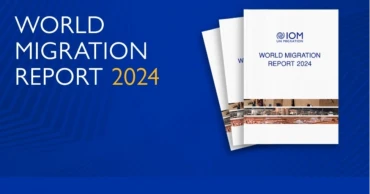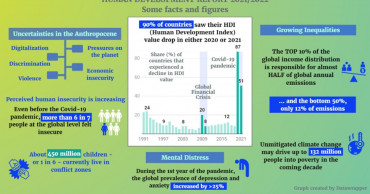human development
Migrant remittances now outpace foreign investments in developing countries: IOM report
International migration remains a driver of human development and economic growth, highlighted by a more than 650 percent increase in international remittances from 2000 to 2022, rising from USD 128 billion to USD 831 billion, according to a new global report released today.
The growth continued despite predictions from many analysts that remittances would decrease substantially because of COVID-19.
The International Organization for Migration (IOM) launched the World Migration Report 2024, which reveals significant shifts in global migration patterns, including a record number of displaced people and a major increase in international remittances.
IOM Director General Amy Pope formally released the report in Bangladesh, which stands at the "forefront of migration" challenges, including emigration, immigration and displacement.
"We hope the report inspires collaborative efforts to harness the potential of migration as a driver for human development and global prosperity," DG Pope said.
By choosing Dhaka as the report's launch site, IOM not only highlights the country's efforts in supporting vulnerable migrants and fostering pathways for regular migration but also recognizes Bangladesh's important role in shaping global migration discourse and policy, IOM said.
As a Global Compact for Safe, Orderly, and Regular Migration Champion country, Bangladesh has demonstrated a strong commitment to addressing migration issues and implementing policies that safeguard migrants' rights, it said.
Read more: Global actors pledge to collaborate on transformation of Bangladesh agriculture
This proactive engagement aligns with IOM's strategic objectives, making Bangladesh an ideal location to launch the 2024 World Migration Report.
Foreign Minister Dr Hasan Mahmud said as one of the GCM champion countries, Bangladesh will not only continue to act upon the pledges it has made for its domestic context but would also take up emerging issues and challenges pertaining to migration and development for informed deliberations at the international level.
“The World Migration Report 2024 helps demystify the complexity of human mobility through evidence-based data and analysis,” Pope said at the launch.
“In a world grappling with uncertainty, understanding migration dynamics is essential for informed decision-making and effective policy responses, and the World Migration Report advances this understanding by shedding light on longstanding trends and emerging challenges.”
Of that 831 billion in remittances, 647 billion were sent by migrants to low and middle-income countries. These remittances can constitute a significant portion of those countries' GDPs, and globally, these remittances now surpass foreign direct investment in those countries.
Highlighting key findings, the report reveals that while international migration continues to drive human development, challenges persist.
Read more: UK Minister for Indo-Pacific arrives Tuesday on two-day visit
With an estimated 281 million international migrants worldwide, the number of displaced individuals due to conflict, violence, disaster, and other reasons has surged to the highest levels in modern-day records, reaching 117 million, underscoring the urgency of addressing displacement crises.
Migration, an intrinsic part of human history, is often overshadowed by sensationalized narratives.
However, the reality is far more nuanced than what captures headlines.
Most migration is regular, safe, and regionally focused, directly linked to opportunities and livelihoods.
Yet, misinformation and politicization have clouded public discourse, necessitating a clear and accurate portrayal of migration dynamics.
IOM’s World Migration Report, with its innovative digital tools and comprehensive analysis, aims to help dispel myths, provide critical insights, and inspire meaningful action in addressing the challenges and opportunities of human mobility.
This launch is part of IOM Director General’s first three-day visit to Bangladesh.
Chief of IOM Mission in Bangladesh Abdusattor Esoev, former Foreign Secretary Shahidul Haque, senior government officials and diplomats stationed in Dhaka were present at the report launching ceremony.
Read more: UK Minister for Indo-Pacific in Dhaka to ‘strengthen’ economic, security, migration partnership with Bangladesh
1 year ago
90% of countries see decline in human development
Multiple crises are halting progress on human development, which is going backwards in the overwhelming majority of countries, according to the UN.
The 2021-22 human development report "Uncertain Times, Unsettled Lives: Shaping our Future in a Transforming World," released Thursday, paints a picture of a global society lurching from crisis to crisis, and which risks heading towards increasing deprivation and injustice.
For the first time in the 32 years that the UN Development Programme (UNDP) has been calculating it, the Human Development Index, which measures a nation's health, education, and standard of living, has declined globally for two years in a row.
Human development has fallen back to its 2016 levels, reversing much of the progress towards the Sustainable Development Goals.
The UN report finds that nine out of 10 countries have fallen behind on life expectancy, education and living standards.
Heading the list of events causing major global disruptions are Covid and the Russian invasion of Ukraine, which have come on top of sweeping social and economic shifts, dangerous planetary changes, and massive increases in polarization.
This signals a deepening crisis for many regions, and Latin America, the Caribbean, Sub-Saharan Africa, and South Asia have been hit particularly hard as 30 years of continuous human progress is unravelling.
Read: Bangladesh moves 3 notches up in Human Development Index
"The world is scrambling to respond to back-to-back crises," said Achim Steiner, UNDP administrator. "We have seen with the cost of living and energy crises that, while it is tempting to focus on quick fixes like subsidising fossil fuels, immediate relief tactics are delaying the long-term systemic changes we must make."
The UN study's authors identified three layers of today's "uncertainty complex" – dangerous planetary change, the transition to new ways of organising industrial societies, and the intensification of political and social polarization.
Also read: Rebuilding Ukraine may cost $349bn
"It is not just that typhoons are getting bigger and deadlier through human impact on the environment," the report said. "It is also as if, through our social choices, their destructive paths are being directed at the most vulnerable among us."
3 years ago
World Environment Day on Friday
The World Environment Day will be observed in the country as elsewhere around the world on Friday with a call to encourage worldwide awareness and action for the protection of the environment.
5 years ago


.jpg)

